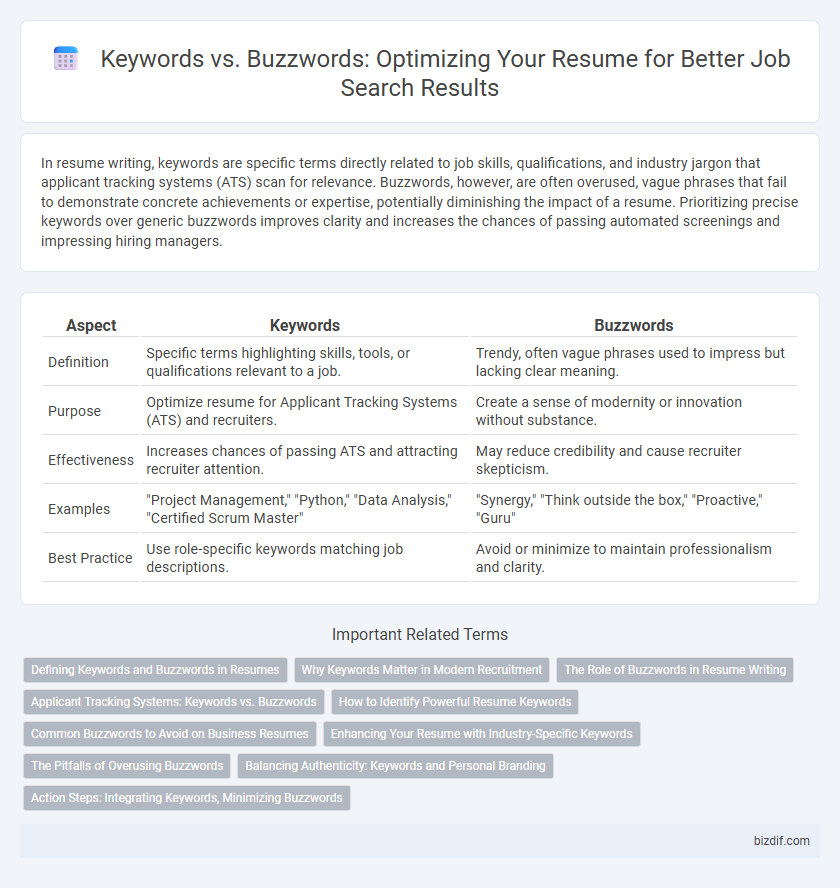In resume writing, keywords are specific terms directly related to job skills, qualifications, and industry jargon that applicant tracking systems (ATS) scan for relevance. Buzzwords, however, are often overused, vague phrases that fail to demonstrate concrete achievements or expertise, potentially diminishing the impact of a resume. Prioritizing precise keywords over generic buzzwords improves clarity and increases the chances of passing automated screenings and impressing hiring managers.
Table of Comparison
| Aspect | Keywords | Buzzwords |
|---|---|---|
| Definition | Specific terms highlighting skills, tools, or qualifications relevant to a job. | Trendy, often vague phrases used to impress but lacking clear meaning. |
| Purpose | Optimize resume for Applicant Tracking Systems (ATS) and recruiters. | Create a sense of modernity or innovation without substance. |
| Effectiveness | Increases chances of passing ATS and attracting recruiter attention. | May reduce credibility and cause recruiter skepticism. |
| Examples | "Project Management," "Python," "Data Analysis," "Certified Scrum Master" | "Synergy," "Think outside the box," "Proactive," "Guru" |
| Best Practice | Use role-specific keywords matching job descriptions. | Avoid or minimize to maintain professionalism and clarity. |
Defining Keywords and Buzzwords in Resumes
Keywords in resumes are specific terms or phrases that match job descriptions, highlighting relevant skills, qualifications, and experiences to pass applicant tracking systems (ATS). Buzzwords are generic, overused expressions like "team player" or "hard worker" that often lack measurable impact and fail to demonstrate unique value. Emphasizing keywords ensures alignment with employer requirements, improving resume visibility and effectiveness.
Why Keywords Matter in Modern Recruitment
Keywords are critical in modern recruitment as applicant tracking systems (ATS) scan resumes for specific terms that match job descriptions, ensuring candidates pass initial screenings. Unlike buzzwords, which are often vague and overused, keywords are precise and tailored to the skills, qualifications, and industry jargon relevant to the position. Proper use of keywords increases the likelihood of a resume being noticed by recruiters and algorithms, ultimately improving chances of securing an interview.
The Role of Buzzwords in Resume Writing
Buzzwords in resume writing serve to quickly capture the attention of hiring managers by highlighting trendy skills and industry-specific jargon, but they often lack specificity and measurable impact. Incorporating relevant keywords, derived from job descriptions and industry norms, ensures that resumes pass Applicant Tracking Systems (ATS) and align more closely with employer expectations. Effective resumes balance buzzwords with concrete achievements and quantifiable results to demonstrate both knowledge and real-world contributions.
Applicant Tracking Systems: Keywords vs. Buzzwords
Applicant Tracking Systems (ATS) primarily scan resumes for relevant keywords that match job descriptions, ensuring candidates meet specific technical qualifications and skills. Keywords are precise, industry-specific terms that improve resume visibility in ATS searches, whereas buzzwords are vague, overused phrases that fail to convey concrete expertise. Optimizing resumes with targeted keywords enhances the chances of passing ATS filters and securing interview opportunities.
How to Identify Powerful Resume Keywords
Powerful resume keywords are specific terms reflecting skills, qualifications, and industry jargon that match the job description, enhancing ATS compatibility and recruiter attention. Identifying these keywords involves analyzing job postings, focusing on repeated phrases related to competencies, certifications, and action verbs that demonstrate measurable achievements. Distinguishing keywords from buzzwords requires prioritizing precise, relevant language over vague or trendy terms that lack substantive connection to the candidate's actual experience.
Common Buzzwords to Avoid on Business Resumes
Common buzzwords to avoid on business resumes include "team player," "hard worker," and "go-getter" as they are overused and lack specific meaning, reducing the impact of your qualifications. Recruiters prefer quantifiable achievements and industry-specific keywords such as "project management," "data analysis," or "stakeholder engagement" that align with the job description. Using targeted keywords improves applicant tracking system (ATS) compatibility and clearly demonstrates relevant skills and experience.
Enhancing Your Resume with Industry-Specific Keywords
Incorporating industry-specific keywords into your resume significantly improves its visibility in applicant tracking systems (ATS) and attracts hiring managers' attention by aligning your skills with job requirements. Unlike buzzwords, which often lack substance and overuse generic phrases, targeted keywords demonstrate your expertise and familiarity with industry standards. Conduct thorough research on job descriptions and professional terminology to select precise keywords that enhance your resume's relevance and impact.
The Pitfalls of Overusing Buzzwords
Overusing buzzwords in resume writing can dilute your message and make your qualifications appear generic and insincere, while well-chosen keywords that align with the job description enhance your chances of passing Applicant Tracking Systems (ATS). Buzzwords like "hardworking" or "detail-oriented" often lack measurable impact, whereas keywords such as "project management," "data analysis," or specific software skills demonstrate relevant expertise. Excessive buzzwords risk alienating recruiters by appearing cliched and can reduce the resume's overall effectiveness in highlighting genuine accomplishments.
Balancing Authenticity: Keywords and Personal Branding
In resume writing, balancing authenticity with strategic keyword inclusion enhances both personal branding and applicant tracking system (ATS) compatibility. Keywords derived from job descriptions improve visibility by aligning with recruiter searches, while personalized language showcases unique skills and professional identity. Maintaining this balance ensures resumes resonate with employers and effectively navigate automated screenings.
Action Steps: Integrating Keywords, Minimizing Buzzwords
In resume writing, integrating industry-specific keywords enhances applicant tracking system (ATS) compatibility and improves recruiter visibility. Focus on embedding precise action verbs and relevant skills that match job descriptions while minimizing overused buzzwords like "team player" or "hardworking" to maintain authenticity. Regularly update keyword lists based on job postings and use quantifiable achievements to demonstrate impact effectively.
Keywords vs Buzzwords Infographic

 bizdif.com
bizdif.com